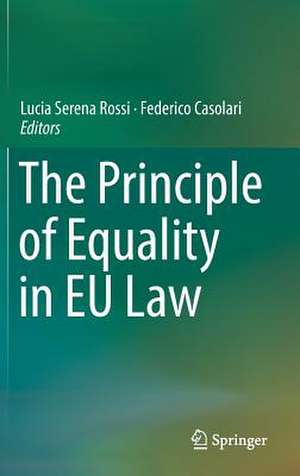The Principle of Equality in EU Law
Editat de Lucia Serena Rossi, Federico Casolarien Limba Engleză Hardback – 13 dec 2017
This book provides a comprehensive and updated legal analysis of the equality principle in EU law. To this end, it argues for a broad definition of the principle, which includes not only its inter-individual dimension, but also the equality of the Member States before the EU Treaties.
The book presents a collection of high-quality academic and expert contributions, which, in light of the most recent developments in implementing the post-Lisbon legal framework, reflect the current interpretation of the equality principle, examining its performance in practice with a view to suggesting possible solutions in order to overcome recurring problems.
To this end the volume is divided into three Parts, the first of which addresses a peculiar aspect of the EU equality that is mostly overlooked in the investigations devoted to this topic, namely, equality among States. Part II shifts to the inter-individual dimension of equality and explores some major developments contributing to (re)shaping the global framework of EU anti-discrimination law, while Part III undertakes a more practical investigation devoted to the substantive strands of that area of EU law.
The book presents a collection of high-quality academic and expert contributions, which, in light of the most recent developments in implementing the post-Lisbon legal framework, reflect the current interpretation of the equality principle, examining its performance in practice with a view to suggesting possible solutions in order to overcome recurring problems.
To this end the volume is divided into three Parts, the first of which addresses a peculiar aspect of the EU equality that is mostly overlooked in the investigations devoted to this topic, namely, equality among States. Part II shifts to the inter-individual dimension of equality and explores some major developments contributing to (re)shaping the global framework of EU anti-discrimination law, while Part III undertakes a more practical investigation devoted to the substantive strands of that area of EU law.
| Toate formatele și edițiile | Preț | Express |
|---|---|---|
| Paperback (1) | 728.60 lei 6-8 săpt. | |
| Springer International Publishing – 4 sep 2018 | 728.60 lei 6-8 săpt. | |
| Hardback (1) | 1115.77 lei 6-8 săpt. | |
| Springer International Publishing – 13 dec 2017 | 1115.77 lei 6-8 săpt. |
Preț: 1115.77 lei
Preț vechi: 1360.70 lei
-18% Nou
Puncte Express: 1674
Preț estimativ în valută:
213.52€ • 221.66$ • 178.05£
213.52€ • 221.66$ • 178.05£
Carte tipărită la comandă
Livrare economică 25 martie-08 aprilie
Preluare comenzi: 021 569.72.76
Specificații
ISBN-13: 9783319661360
ISBN-10: 3319661361
Pagini: 315
Ilustrații: XVII, 316 p.
Dimensiuni: 155 x 235 mm
Greutate: 0.64 kg
Ediția:1st ed. 2017
Editura: Springer International Publishing
Colecția Springer
Locul publicării:Cham, Switzerland
ISBN-10: 3319661361
Pagini: 315
Ilustrații: XVII, 316 p.
Dimensiuni: 155 x 235 mm
Greutate: 0.64 kg
Ediția:1st ed. 2017
Editura: Springer International Publishing
Colecția Springer
Locul publicării:Cham, Switzerland
Cuprins
Part I Equality and States: Are Some States More ‘Equal’ than Others?.- Part II The Structural Aspects of the Principle of Equality in the EU.- Part III Equality in Specific Policy Domains of the EU.
Notă biografică
Lucia Serena Rossi is Full Professor of European Union Law at the University of Bologna where she also directs the International Research Centre on European Law (CIRDE).
Federico Casolari is Associate Professor of European Union Law at the University of Bologna where he also teaches Law of International Organizations.
Textul de pe ultima copertă
This book provides a comprehensive and updated legal analysis of the equality principle in EU law. To this end, it argues for a broad definition of the principle, which includes not only its inter-individual dimension, but also the equality of the Member States before the EU Treaties.
The book presents a collection of high-quality academic and expert contributions, which, in light of the most recent developments in implementing the post-Lisbon legal framework, reflect the current interpretation of the equality principle, examining its performance in practice with a view to suggesting possible solutions in order to overcome recurring problems.
To this end the volume is divided into three Parts, the first of which addresses a peculiar aspect of the EU equality that is mostly overlooked in the investigations devoted to this topic, namely, equality among States. Part II shifts to the inter-individual dimension of equality and explores some major developments contributing to (re)shaping the global framework of EU anti-discrimination law, while Part III undertakes a more practical investigation devoted to the substantive strands of that area of EU law.
The book presents a collection of high-quality academic and expert contributions, which, in light of the most recent developments in implementing the post-Lisbon legal framework, reflect the current interpretation of the equality principle, examining its performance in practice with a view to suggesting possible solutions in order to overcome recurring problems.
To this end the volume is divided into three Parts, the first of which addresses a peculiar aspect of the EU equality that is mostly overlooked in the investigations devoted to this topic, namely, equality among States. Part II shifts to the inter-individual dimension of equality and explores some major developments contributing to (re)shaping the global framework of EU anti-discrimination law, while Part III undertakes a more practical investigation devoted to the substantive strands of that area of EU law.
Caracteristici
Represents a comprehensive, in-depth legal analysis of the actual understanding of the equality principle at EU level after a period of significant change Draws on new and recent elements of practice implementing the post Lisbon EU legal framework to offer an updated exploration of this topical area of EU law Examines the way in which the Union ensures the respect of the equality of the Member States before the founding Treaties Examines the performance of the equality principle in practice and suggests ossible solutions in order to strengthen its application
